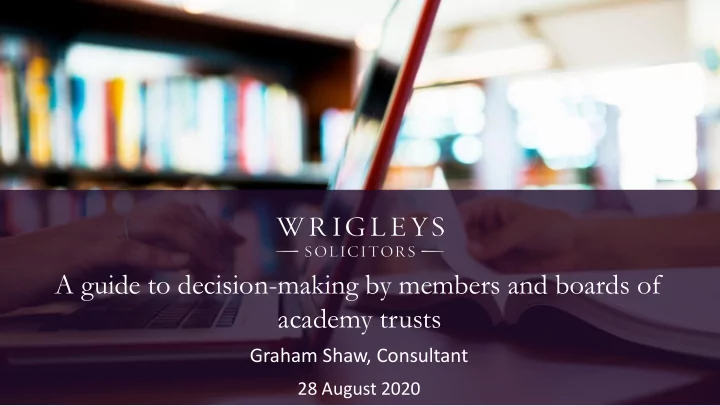

A guide to decision-making by members and boards of academy trusts Graham Shaw, Consultant 28 August 2020
Overview • Why is good decision-making important? • The legal and regulatory framework • The roles of members and trustees • The legal requirements of decision-making • Good practice in decision-making
Why is good decision-making important? Supports Legal Covid-19 good requirement governance Benefits your students Avoids Underpins Regulatory scrutiny and your future compliance intervention success
The legal and regulatory framework Academies Financial Handbook Funding Agreement Articles of Association Charity Law Company Law
The role of the members Approve change of name Approve Appoint changes to trustees the articles Ultimate Remove guarantee trustees Fiduciary duty to act in Delegate to trust’s best trustees interests
The role of the trustees - company law duties Avoid conflicts of interest Declare Exercise interest in independent proposed judgement transaction/ arrangement Not accept Promote the benefits success of from third the company parties Act within Exercise the powers reasonable of the care and skill company
The role of the trustees – charity law duties In good faith (with honest intentions and motives) For public Prudence benefit In best Promote Within interests of charitable powers charity and purposes beneficiaries With Act undivided collectively loyalty
Legal requirements - decisions by the members (1) • Where are resolutions passed? – Annual General Meeting (AGM), if in articles – other general meetings • Can resolutions be passed without a meeting? – yes, by written resolution sent to every member – can be circulated in hard copy or by email – signed, dated and returned (same or separate copies)
Legal requirements - decisions by the members (2) • Can the members meet by phone or video? – not under the DfE model articles but …. – the articles can be updated (DfE consent?) and – members can agree to meet remotely (trumps articles) • What is the procedure for calling a meeting? – not less than 14 days’ notice unless 90% agree – notice sent to members, trustees and auditors – notice must specify meeting type, nature of business and any special resolution
Legal requirements - decisions by the members (4) • How are resolutions passed? – one vote each – show of hands – secret ballot, if chair or 2 or 10% of trustees demand – ordinary resolution – majority decision – special resolution – 75% decision (e.g. change articles) – meeting must be quorate – conclusive evidence – chair’s declaration and entry in minutes
Legal requirements - decisions by the members (5) • What is the procedure once a resolution is passed? – minutes signed by the chair of the meeting – minutes kept at RO (or address notified to CH) for 10 yrs – special resolution filed with CH within 15 days – new director registered with CH within 14 days
Legal requirements - decisions by the trustees (1) • Where are resolutions passed? – normally at a meeting of the trustees • Can the trustees pass resolutions without meeting? – yes, by written resolution circulated to trustees – signed, dated and returned (hard copy or email) • Can the trustees pass resolutions by email? – technically yes, but care needed to evidence a clear decision
Legal requirements - decisions by the trustees (2) • What is the procedure for calling a meeting? – convened by clerk or company secretary who … – must comply with trustees, 3 trustees, chair (or v/chair) – not less than 7 days’ notice or less if chair decides urgent – agenda must accompany the notice • Can the trustees meet by phone or video? – yes, if details circulated at least 48 hours in advance and … – trustees have access to the appropriate equipment
Legal requirements - decisions by the trustees (3) • How are resolutions passed? – one vote each – casting vote for chair – majority decisions • What is the procedure for resolutions at meetings? – meeting must be quorate – three or one third but … – two thirds if decision to remove chair or v/chair (confirmed within 14 days) – conflicts of interest – declare, be absent (still quorate?) and don’t vote
Legal requirements - decisions by the trustees (4) • What is the procedure once a resolution is passed? – minutes must be taken and kept for at least 10 years – agenda, minutes, papers to DfE on request unless … – staff, student or trust reasonably believes is confidential
Good practice in decision-making (1) Decision Openness and Organisational making, risk purpose accountability and control Charity Leadership Governance Code Board Diversity Integrity effectiveness
Good practice in decision-making (2) Agree Meet often Effective team acceptable enough to be level of risk effective Regular Recommended benchmarking practice Make Take advice Effective chair informed decisions
Good practice in decision-making (3) • Code of conduct for trustees – an agreed set of guidelines – not a legal requirement – confirms expected behaviours – codifies what works well – builds team
ANY QUESTIONS? Graham Shaw Consultant 0113 204 1138 07955 855 314 graham.shaw@wrigleys.co.uk
Recommend
More recommend